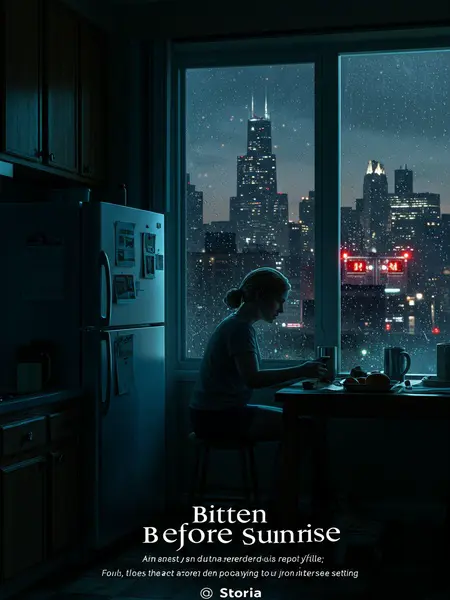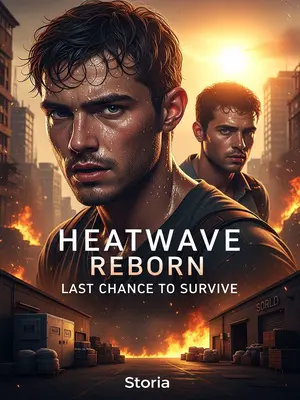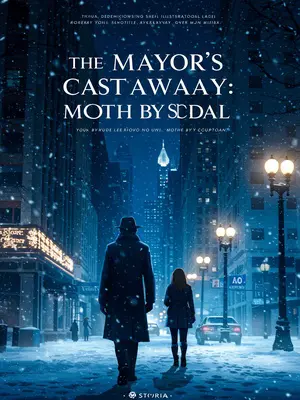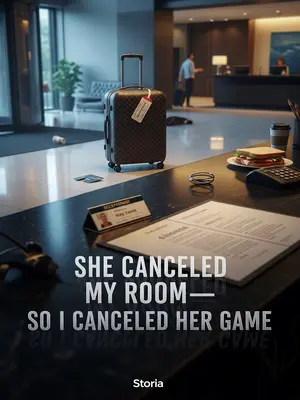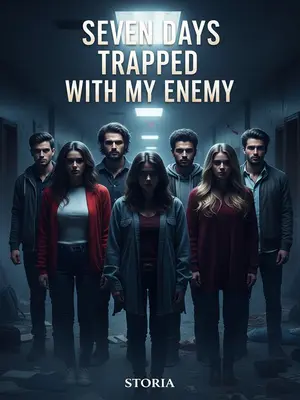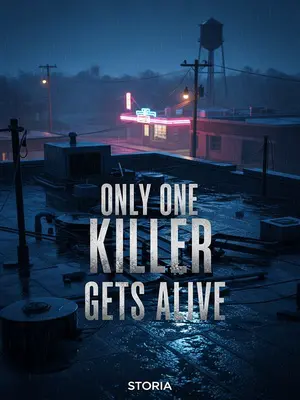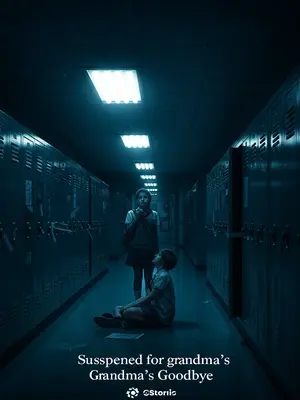Chapter 3: Fortress
The plane flew smoothly, but my stomach churned.
Turbulence didn’t bother me; it was the memory of that face, the unnatural way it moved. I pressed my forehead to the window, willing myself not to puke.
The highly decayed face of that zombie at takeoff replayed in my mind.
I closed my eyes and tried to focus on the drone of the engines, the hum of the air vents. But all I could see was rot, all I could hear was that desperate, animal sound.
I lowered the tray table, leaned over, and tried hard to control my urge to vomit.
I bit the inside of my cheek and counted backward from ten. My hands shook so badly the tray rattled.
“Hold on, throwing up now would attract attention.”
The voice in my head was grim but rational. I forced myself to breathe in slow, measured counts, pretending I was anywhere else but a tin can flying over a world gone mad.
The torturous two-hour flight passed with me constantly encouraging and warning myself.
Every time the flight attendants walked by, I feigned sleep. My nerves were stretched to a thread.
As soon as I got off the plane and breathed Willow Creek’s fresh air, my stomach finally felt a bit better.
The sharp tang of grass and earth hit me. I gulped it in like medicine.
Unexpectedly, someone else was just as sick—a middle-aged man who started vomiting violently on the tarmac after getting off.
I gave him a wide berth, heart thudding. Every cough sounded like a warning bell.
I made sure to stay away from him. Besides the terrifying zombies, we also had to worry about certain viruses and cholera.
Paranoia reigned. I wished for a bottle of Purell and a hazmat suit.
Before entering the terminal, I glanced back at him. Several staff and helpful passengers were surrounding him.
A young guy in an orange vest handed him a water bottle. Someone else dialed a number, frowning with concern.
He hadn’t finished vomiting, his waist bent like the letter n, his throat making strange “ho—ho—” sounds like a leaky organ.
The sound cut through the calm of the small airport, turning a handful of heads.
He didn’t look good.
I made a mental note to avoid that part of the baggage claim. Better safe than sorry.
Outside the airport, I immediately spotted my dad.
His old blue Ford was parked haphazardly, tailgate open. He waved both arms, grinning like I’d just scored the winning touchdown.
He walked over in a few steps and took my suitcase. At a time when everyone should be worried about themselves, we both smiled with relief.
He pulled me into a quick, fierce hug. For a second, everything felt almost normal.
With the end of the world coming, I was grateful to be with my family.
No matter what happened, we were together. That was enough.
After getting in the car, I immediately noticed the back seat was packed full of hardware store items I didn’t even recognize, boosting my sense of security again.
There were coils of rope, boxes labeled “reinforced hinges,” even a few crowbars. My dad didn’t mess around.
Turns out, having a home—and parents who know how to prepare—is worth more than gold right now.
I flashed back to all the years I’d taken my parents for granted. Now, every moment felt precious.
My dad tossed my suitcase in the trunk and got in.
“Honey, we can’t go home yet. We have to finish buying everything today, and starting tomorrow, we shouldn’t go out.”
He sounded so calm, like he was just planning a regular weekend project.
I nodded quickly, thinking this was a great idea.
There was no use arguing—I trusted his instincts. He’d been through blackouts, tornadoes, even a chemical spill back in Dayton.
If we finished buying all the supplies today, the three of us could live comfortably for a year at home, and our survival chances would be much higher tomorrow.
I made a mental checklist: food, water, fuel, batteries, first aid. My mind raced with what I might have forgotten.
In a year, we could exercise at home, get stronger, and wait for rescue.
The idea was strangely comforting. A year in lockdown—if anyone could manage, it was us.
If I were alone, it would be fine, but thinking of my aging parents having to find supplies in the apocalypse made me wish I had three heads and six arms to protect them.
I squeezed my dad’s hand, silently promising to do whatever it took.
Then my dad and I started a shopping spree.
We hit every store in town—Home Depot, the aisles stripped bare—no flashlights, no duct tape, not a single can of beans in sight. My dad muttered, “This is worse than Black Friday.” I ran through the aisles, tossing things in the cart like it was Black Friday.
I was amazed again by his buying power.
He negotiated discounts like a pro, flashing his union card and charming cashiers. The trunk filled up with every trip.
We swept up things I never even thought of—steel wire, iron chains, reinforced locks, soundproofing foam, and so on. By the end, even I thought it was a bit much.
I joked about him building a medieval castle. He grinned, “Better safe than sorry.”
Before a home improvement store closed, my dad ordered the highest-strength shatterproof glass and doors.
He argued with the manager about delivery times, waving his wallet like a white flag.
They said they were out of stock and installation would take three days.
Dad didn’t flinch—he just pulled out another fifty. The manager’s attitude changed fast.
My dad waved his hand and offered more money. The manager immediately smiled and said they could come right away.
We followed the delivery van home, trunk creaking under the weight of our supplies.
I didn’t say much the whole time, just followed my dad and pushed the cart.
I was in awe. When had I become the kid again, following his lead?
As the pile grew higher, my dad was finally satisfied, and we drove his SUV with the manager and workers to our home.
I could see the exhaustion in his face, but he never slowed down. The workers seemed impressed by his determination.
Maple Heights Estates is a new development with a low occupancy rate. Only about ten families had moved in so far.
The drive through the empty streets was eerie. For the first time, the quiet felt like a warning instead of a blessing.
There are four gates in total, but only the north main gate was open, which is right next to our Building 12. Moving companies could come in easily.
We waved at the guard, who barely looked up from his phone. The normal rules were slipping away.
We spent half an hour moving everything upstairs. The workers were quick and soon replaced the doors.
The thud of the new doors being installed was weirdly reassuring. I checked every lock twice.
I called my mom to see when she’d be back.
She picked up on the first ring, voice breathless. I could hear the rustle of shopping bags.
She was in the middle of haggling with a clothing seller at the department store. When I called, she immediately said, “Okay, I’ll come home first. I can’t get the price down today, I’ll try the mall again tomorrow.”
I could hear her rolling her eyes at the stubborn clerk. Even in a crisis, Mom loved a bargain.
“Hey!” The seller gave in, “Fine, you win. Take it at this price.”
I stifled a laugh as my mom crowed in triumph. She was unstoppable.
My mom beamed. While the seller packed the clothes, I quickly asked, “Mom, when will the meat and solar generator be delivered?”
She lowered her voice: “The wholesale market will put the meat straight in our fridge. The fridge and meat seller are from the same shop.”
I was impressed by her logistics. She’d thought of everything.
“The solar generator is here. I had them leave it at the door of 1502. I know that place, it’s not renovated yet, so no one will see.”
She’d even scouted out hiding places. I made a mental note to thank her later.
“The rest I had put in the stairwell on the 20th floor. No one goes that high, and no one lives above the 20th floor.”
Her caution made me proud—and a little paranoid. But it was the right move.
After hanging up, I went to the 15th floor to check the solar generator, then quietly climbed to the 20th floor to check the deliveries against my list.
I moved quietly, eyes darting to every creak in the hallway. My hands shook as I counted boxes, relief flooding me as everything checked out.
Cases of water, toilet paper, self-heating meals, lime, water barrels, rain collectors, rubbing alcohol—all delivered.
I stacked everything carefully, labeling boxes in sharpie. This was our fortress now.
There was so much stuff, it was stacked from the 20th to the 24th floor.
Our supplies formed a makeshift barricade. I kept expecting someone to question me, but no one did.
Because we brought outsiders in, I was a bit worried about leaving supplies in the stairwell.
I kept peeking over my shoulder, ready with a story about a charity drive if needed.
Since I had nothing to do with the glass installation, I sat in the stairwell until the workers finished and left, then went downstairs to call my dad to help move supplies.
Every minute, I checked my phone, half expecting another emergency alert.
Stockpiling is satisfying, but moving it is exhausting.
My arms felt like jelly. My shirt stuck to my back, but I didn’t dare take a break.
My dad and I carried a quarter of it before my mom came back.
She breezed in, bags swinging from both hands, a triumphant grin on her face.
She was carrying three bags in each hand and couldn’t help us.
“Don’t worry, I’ll cook later,” she promised, kicking off her shoes.
By 9 p.m., we’d moved over half the supplies. That’s when the delivery from the online shop arrived.
The sound of the truck’s engine was music to my ears. We rushed downstairs, waving to the driver.
The delivery man dumped everything at the B1 entrance of Unit 1. We figured we’d finish moving the stuff upstairs later, but the stuff downstairs was blocking the way and attracting attention.
I caught the suspicious looks of a few neighbors, but ignored them. Let them gossip.
So each of us grabbed a handcart and went down to B1 to organize the goods.
It was a family assembly line—Dad stacking, me sorting, Mom checking off the list. The unity felt good.
During this, I felt dizzy several times, but moving the supplies home was satisfying.
I told myself the exhaustion was a good sign—we were working, not just worrying.
Finally, exhausted, we each ate a chocolate bar and kept working.
It was the best chocolate I’d ever tasted—simple, sweet, life-affirming.
Around 11 p.m., the meat and fridges my mom ordered finally arrived.
The delivery guys looked at us like we were nuts, but I didn’t care. I tipped them extra and wished them luck.
Our building has one elevator per apartment, two apartments per floor, with a solid fire door in the middle.
I tested the door, relieved to feel how sturdy it was. One less thing to worry about.
We wanted to save trouble and have them deliver next door.
It seemed easier, but we were wary of prying eyes.
But my mom thought it was weird to deliver meat at night, and with all our supplies piled up, we couldn’t let them see.
Her caution paid off—we stayed invisible, just another quiet family in a half-empty building.
So she had them deliver to the entrance of Unit 2 in Building 10 across the way.
I jogged over, heart pounding, and helped Mom wheel everything back across the parking lot.
The delivery boss seemed normal and agreed readily.
He didn’t ask questions, just took the tip and left. Sometimes, money really is the universal language.
My parents went from B1 in Building 11 to Unit 2 in Building 10, then used a big cart to bring the fridge back.
I trailed behind, pushing a cart of frozen chickens, pretending not to notice the weird looks from a late-night dog walker.
I wasn’t idle either, knowing their backs would be sore for days, so I moved the remaining supplies from B1 myself.
My arms burned, but I refused to stop. I was fueled by sheer adrenaline.
The whole family worked until 2 a.m. before all the supplies were home.
We collapsed on the living room floor, panting and laughing, surrounded by stacks of boxes. For a moment, it felt almost like an adventure.
Now, less than 6 hours remained before Chicago locked down.
I glanced at the clock, feeling every minute tick by like a countdown.
The quiet at night in the complex was terrifying. I wasn’t in the mood to sleep, and the house was a mess from all the supplies, nowhere to sit, with piles waiting to be sorted.
The silence was broken only by the soft hum of the fridge and the faint cluck of a hen from the kitchen balcony.
While my parents worked on the solar generator, I went to the kitchen and cooked three bowls of mac and cheese.
It felt good to do something normal. I sang along softly to the radio while the noodles boiled.
Though I hadn’t cooked much in the past two years, I’d learned a lot from YouTube videos.
I remembered the tips from Bon Appétit and a few viral TikToks—add butter, stir constantly, always taste before serving.
The box was classic Kraft, the neon cheese powder a taste of every childhood snow day.
I took enough pasta for three, boiled water until it bubbled, and quickly tossed in the noodles.
The scent of melting cheese filled the kitchen, cutting through my exhaustion.
Then I took three big bowls from the cupboard, put a spoonful of butter in each, sprinkled some scallions, added soy sauce, a little chicken bouillon, and salt.
I hesitated at the soy sauce—Mom’s Midwest twist—but it worked. The flavors mingled perfectly.
When the noodles were rolling in the water, I ladled out some broth and poured it over the seasonings.
The steam and aroma filled my senses, and my stomach growled. When the broth mixed with the seasoning, I turned off the heat, scooped the noodles, and finished quickly.
My hands shook as I carried the bowls to the table, but the smell made it all worth it.
Three bowls of homemade mac and cheese were ready.
Mom and Dad came in, hair mussed, eyes bright. We dug in, too hungry to talk.
I set the bowls on the coffee table. My parents were hungry too, so they put down the almost-assembled solar generator, and the three of us sat on the floor and quickly finished a bowl of hot mac and cheese.
Mom hummed with pleasure, Dad sipped the last of the sauce straight from the bowl.
My dad even drank all the sauce, sweating with satisfaction.
He patted his stomach, grinning. “Best meal I’ve had in weeks.”
A good sweat drives out the cold and revives the spirit.
We all laughed, a little giddy, the tension easing for a moment.
We rested a bit and continued sorting supplies.
We put on a playlist of oldies, working in companionable silence, only breaking to share a snack or joke.
The 5KW solar generator was almost ready. The rest—rainwater collectors and filters—weren’t needed yet.
Dad double-checked the wiring, Mom read the manual out loud, me squinting at the diagrams.
Although it was July, the Willow Creek forecast predicted a cold spell and little rain, so we decided to leave the unused items on the balcony for now.
I peeked outside. The wind rattled the windows, the sky turning pale blue as dawn crept in.
Next, my mom made a work plan.
She pulled out a notepad, jotting down to-dos with military precision.
She and I would sort food, my dad would sort tools, and the rest could wait until tomorrow.
We assigned corners of the house for different supplies—pantry, garage, spare bedroom. The place looked like a cross between a Costco and a bomb shelter.
Luckily, our new house had only a bookshelf in the study and no desk yet, saving a lot of space.
We stacked boxes where the desk would have gone. “Guess I won’t be working from home for a while,” I joked.
Also, the spare bedroom had only a double bed. The custom furniture for the other room wouldn’t arrive until next month, but now it seemed unnecessary.
Mom shrugged. “We’ll make do. It’s just stuff.”
So, with little need to move furniture, we finished sorting supplies by 5 a.m., exceeding our goal.
I slumped against the wall, too tired to stand, but oddly satisfied.
But with only 2,000 square feet, so many supplies meant there was hardly anywhere to step except the living room rest area. The whole house looked like a warehouse.
It was chaotic, but safe—our fortress in the storm.
With over two hours until Chicago’s lockdown, none of us felt sleepy. My dad mopped the floor, my mom started sprouting seeds, and I fed the four hens my mom had brought from the market last night.
The hens clucked softly, pecking at the feed. Mom beamed, proud of her mini-farm.
The hens were kept on the kitchen balcony, with only chickens and lots of soundproofing foam, and even an air purifier.
I checked the air filter, adjusted the foam, and made sure the window was cracked just enough.
After feeding them, I closed the door. You couldn’t even hear a rooster crow.
The apartment was so insulated, it felt like we were living inside a snow globe.
It was already bright outside.
Sunlight streamed through the windows, glinting off cans and bottles stacked to the ceiling.
I used the water barrel to start storing water, then opened Facebook.
My fingers hesitated over the keyboard, searching for any sign that the outside world was catching on.
I thought there’d be some inside news, but all I saw was everyone living peacefully.
People were posting vacation pics, memes, brunch selfies—blissfully unaware.
Only a few people had checked in from abroad, posting cryptic messages.
A couple of friends in Europe posted, “Stay safe, Chicago,” but no one responded. I felt like I was peering through a window at a party I’d been kicked out of.
While the world seemed at peace, our family was eating my mom’s sandwiches.
Simple, familiar, comforting. I watched Mom assemble them, her hands steady, her face soft with love.
The sandwich had a slice of tomato, a fried egg, and bacon.
The egg sizzled, bacon crisped, tomato glistened red. It was the kind of sandwich that tasted like home.
One bite and the juice exploded in my mouth, so delicious it made me sleepy.
My eyelids drooped. I yawned, leaning back against the fridge, feeling for a second that maybe everything would be okay.
“Bang———”
A loud bang.
The sound shattered the calm. I froze, sandwich halfway to my lips.
My drooping eyelids snapped open.
A split second later, my heart kicked into overdrive. I was wide awake, senses screaming.
Before my sluggish brain could react, a piercing scream echoed through the complex.
The scream sliced through the morning. I dropped my sandwich. Outside, the nightmare wasn’t waiting anymore—it was here.
